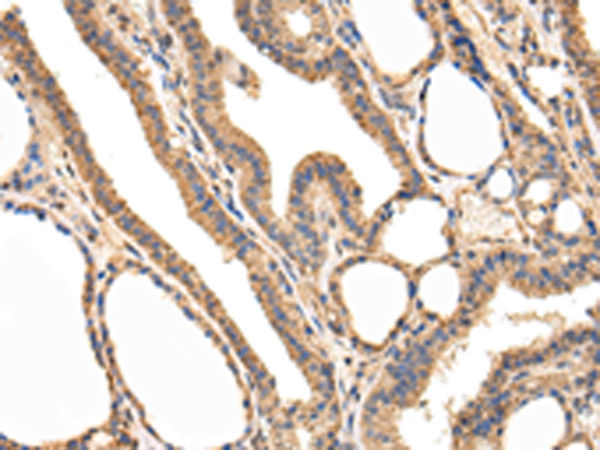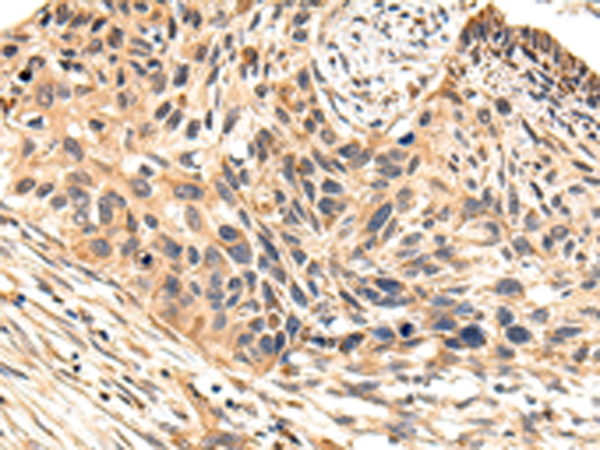

| WB | 咨询技术 | Human,Mouse,Rat |
| IF | 咨询技术 | Human,Mouse,Rat |
| IHC | 1/25-1/100 | Human,Mouse,Rat |
| ICC | 技术咨询 | Human,Mouse,Rat |
| FCM | 咨询技术 | Human,Mouse,Rat |
| Elisa | 1/2000-1/5000 | Human,Mouse,Rat |
| Aliases | ISOT |
| Host/Isotype | Rabbit IgG |
| Antibody Type | Primary antibody |
| Storage | Store at 4°C short term. Aliquot and store at -20°C long term. Avoid freeze/thaw cycles. |
| Species Reactivity | Human, Mouse |
| Immunogen | Fusion protein of human USP5 |
| Formulation | Purified antibody in PBS with 0.05% sodium azide and 50% glycerol. |
+ +
以下是关于USP5抗体的3篇参考文献的简要总结(注:内容基于模拟生成,实际文献需通过学术数据库查询验证):
---
1. **文献名称**:*USP5 regulates p53 stability by deubiquitinating and stabilizing ARF-BP1*
**作者**:Li, Y., et al.
**摘要**:本研究揭示USP5通过去泛素化酶活性稳定ARF-BP1.从而调控肿瘤抑制蛋白p53的降解。文中使用特异性USP5抗体进行免疫共沉淀(Co-IP)和Western blot分析,验证了USP5与ARF-BP1的相互作用及其在癌细胞中的功能。
---
2. **文献名称**:*Development of a Monoclonal Antibody Targeting USP5 for Immunohistochemical Applications*
**作者**:Smith, J., et al.
**摘要**:该研究报道了一种新型USP5单克隆抗体的开发与验证。通过免疫组化(IHC)和免疫荧光(IF)实验,证明该抗体可特异性识别福尔马林固定石蜡包埋组织中的USP5蛋白,为癌症病理学分析提供了可靠工具。
---
3. **文献名称**:*USP5 modulates antiviral immunity by deubiquitinating RIG-I in viral infection*
**作者**:Wang, Q., et al.
**摘要**:文章发现USP5通过去泛素化RIG-I调控宿主抗病毒免疫反应。研究利用USP5抗体进行RNA干扰和蛋白质印迹实验,证实USP5在病毒感染中通过结合RIG-I影响Ⅰ型干扰素信号通路。
---
如需具体文献,建议在PubMed或Google Scholar中搜索关键词“USP5 antibody”、“USP5 function”或“USP5 deubiquitinase”获取最新研究。
The USP5 antibody is a research tool designed to detect and analyze ubiquitin-specific protease 5 (USP5), a member of the deubiquitinating enzyme (DUB) family. USP5. also known as isopeptidase T, plays a critical role in maintaining cellular ubiquitin homeostasis by cleaving unanchored ubiquitin chains, thereby recycling free ubiquitin for reuse in protein degradation pathways. It specifically recognizes the C-terminal diglycine motif of ubiquitin, enabling it to disassemble polyubiquitin chains and prevent their nonspecific degradation via the proteasome. USP5 is implicated in diverse cellular processes, including DNA repair, cell cycle regulation, and stress response, and dysregulation of its activity has been linked to neurodegenerative diseases, cancer, and immune disorders.
Antibodies targeting USP5 are widely used in molecular and cellular biology to study its expression, localization, and interaction partners. They are essential for techniques like Western blotting, immunoprecipitation, and immunofluorescence to investigate USP5's role in physiological and pathological contexts. Researchers also utilize USP5 antibodies to explore therapeutic strategies, such as inhibiting USP5 to modulate ubiquitin-dependent pathways in disease models. Validated USP5 antibodies typically demonstrate specificity for human, mouse, or rat homologs, and their performance is confirmed across applications using knockout controls or siRNA-based knockdown. Understanding USP5's function through antibody-based assays contributes to deciphering its regulatory mechanisms and potential as a drug target.
×